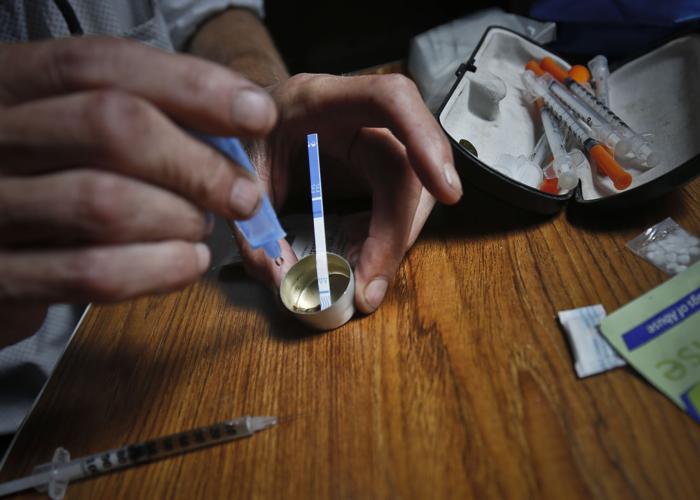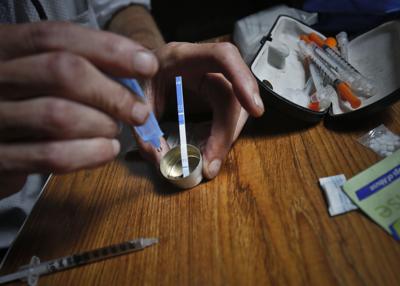Local governments and drug treatment organizations standing by for the state to distribute $36 million from an opioid lawsuit settlement now have to wait longer to see if the money will ever arrive, or whether they'll get as much as they expected.
The money is stalled because an anonymous member of the Legislature's powerful Joint Finance Committee submitted an objection to the Department of Health Services’ plan to spend it.
Those waiting for the money might never know why the funds are being held up, or who is blocking the spending plan from moving forward. That’s because in the state budget committee, a single anonymous objection can block spending packages from moving forward until leadership decides otherwise.
Committee co-chairs Sen. Howard Marklein, R-Spring Green, and Rep. Mark Born, R-Beaver Dam, sent a letter April 22 to state health department Secretary-designee Kirsten Johnson announcing a rejection of the spending plan. The letter contained a mere two paragraphs and cited no reason for the objection.
“An objection has been made to this request and a meeting of the Joint Committee on Finance will be scheduled,” the letter reads. “Therefore, the request is not approved at this time.”
Marklein’s office did not grant the Cap Times’ request to interview the senator about the objection. The Cap Times sent a series of questions to the senator’s office regarding the motivations for blocking the funding, when the committee will meet again to review the plan and whether Marklein himself supported the Department of Health Services’ outline for how the money should be spent.
Katy Prange, Marklein’s chief of staff, responded with the following statement on behalf of the senator and Born:
“The Joint Committee on Finance is engaging with stakeholders to ensure our state’s plan for using these settlement dollars takes the most effective approach to preventing opioid use disorders and mitigating the impact of this ongoing crisis in our state.”

Sen. Howard Marklein, R-Spring Green, is the co-chair of the Joint Finance Committee and would not say why his committee is blocking $36 million for drug treatment programs.
The senator’s office did not respond to a follow-up request for more details on what the stakeholder engagement involved and when the committee plans to take up the funding request.
The Department of Health Services in early April unveiled its 31-page plan, which outlined how the funding should be distributed. At the time, Johnson emphasized the importance of the funding while also criticizing the budget committee for removing money for opioid abuse prevention programs from previous proposals.
For example, the committee rejected $1 million for proposed community prevention efforts and $2 million for family support centers in the health department’s fiscal year 2023 plan. The committee approved $250,000 of a proposed $2 million for school prevention programs that same year, according to records from the DHS.
“It is heartbreaking when people overdose, but it is also incredibly challenging to see a loved one struggling with substance use disorder,” Johnson said in a statement when the plan was released earlier this month. “This is really intentional around both prevention, and supporting people through the recovery process, and their families, and the people who love them.”
Johnson was unable to be reached for direct comment Tuesday, but a health department spokesperson told the Cap Times that officials had met with the committee to explain the proposal before submitting it.
“We are disappointed by the objection raised by the Joint Committee on Finance. In an effort to avoid an objection, we met with every member of the committee, detailing the reasons that informed each of the strategies and responding to all questions raised,” DHS spokesperson Elizabeth Goodsitt wrote in an email to the Cap Times. “Each of our proposed strategies sought to sustain and grow those which were approved by the committee in past years and provide a voice to Wisconsinites impacted by the opioid epidemic. We look forward to understanding and addressing the committee’s objection as it is critical to move this work forward.”
How the money would be spent
The money itself comes from a court settlement agreement with drug companies Cardinal, McKesson, AmerisourceBergen and Johnson & Johnson. The state is slated to receive a total of $750 million. The first three companies are required to shell out settlement money to the state of Wisconsin for the next 14 years while Johnson & Johnson is tapped to pay for the next seven years.
The health department’s outline for the $36 million received this year included:
$6 million for tribal nations;
$5 million for community, education and after-school prevention efforts;
$5 million for family support and resource centers;
$5 million for peer support in opioid treatment programs;
$3.5 million for the overdose treatment drug Narcan;
$3 million for building projects for recovery housing programs;
$2.5 million for residential treatment costs for Medicaid members;
$1.5 million for data collection;
$1.5 million for overdose prevention tools and resources distributed by first responders for people who experience an overdose;
$1 million for fentanyl test strips;
$1 million for public health vending machines to distribute Narcan and test strips to individuals who wish to remain anonymous;
and $1 million for law enforcement grants.
This is the third annual set of spending the DHS has brought forward. Each year’s proposal must be approved by the legislative finance committee before distribution.
Attorney general: 'Disappointing'
Wisconsin Attorney General Josh Kaul, who helped litigate the lawsuit that led to the settlement, told the Cap Times the committee’s rejection was “disappointing but not surprising.”
“The secretary-designee of DHS and I held several roundtables around the state, where we heard from folks who are on the frontlines of the fight against the opioid epidemic, including public health professionals and treatment providers and others,” Kaul said. “And this plan reflects the input that we received and the best judgment of our state's public health experts on how we can most effectively spend these dollars.”

Attorney General Josh Kaul told the Cap Times the ball is now in the finance committee's court when it comes to the distribution of millions in funding for drug treatment resources across the state.
This is not the first time the finance committee has rejected funding proposals, Kaul noted.
Two years ago, the committee approved $31 million and last year another $8 million, both of which left out certain portions of spending for resources from original DHS proposals.
A 2021 law dictates that 70% of the settlement funding must go to the 87 local Wisconsin governments who participated in the lawsuit and 30% of the money will go to the state.
“Ultimately, efforts to combat the opioid epidemic happen at the local level,” Kaul said. “It's local public health professionals, treatment providers and communities across Wisconsin, it's educators who are talking to young people about the dangers of opioids, that's where change is happening and needs to happen.”
Kaul had met with county law enforcement and Menominee Tribal Police officials in the northeast town of Shawano earlier Tuesday to discuss how grant funding from previous years’ settlement distributions was helping community leaders address opioid abuse in the area.
The attorney general said he hopes the finance committee will move quickly in its review process and keep as much of the proposal intact as possible.
“The ball is in the Joint Finance Committee’s court now,” Kaul said. “It's my hope that any changes are minimal, given the thought and input that the Department of Health Services obtained in developing their plan.”
The attorney general confirmed that state officials have not been told what aspects of the funding plan the finance committee objects to.
Sen. Roys: ‘We get nothing, no information’
The way budget committee leaders allow legislators to anonymously reject funding requests, and then their failure to schedule a timely hearing and release the money, has been called a “pocket veto” by critics.
That includes Whitefish Bay Sen. Deb Andraca, one of four Democrats on the 16-member budget committee, who raised concerns over the tactic when the committee rejected a number of project funding proposals last year.
Madison Sen. Kelda Roys, one of the three other Democrats on the committee, said the lack of transparency happens within the group as well.

Madison Democratic Sen. Kelda Roys told the Cap Times that Democrats on the Legislature's Joint Finance Committee are regularly left out of the loop on why funding is held up.
“We get nothing, no information. And this is why this process is so broken,” Roys told the Cap Times. “The idea that one legislator should be able to anonymously hold millions of dollars away from communities that need it. It's ludicrous. It's terrible governance.”
It remains to be seen how the budget committee will move forward with the health department’s spending proposal.
Gov. Tony Evers’ administration has little means to compel the release of the money, Roys said.
“We always ask them to have hearings. We try to get information. We talk to the staffers, we try to figure out what's going on. But ultimately, you know, they're the ones who control what happens,” Roys said of the committee’s Republican leaders.
The governor did not provide a direct response to the committee’s blocking of the funding, but Evers’ office told the Cap Times Tuesday the lack of reasoning stated by committee leaders "just further underscores the absurdity of Republicans’ ongoing obstruction of efforts to address real and pressing challenges facing our state."
“Republicans are on Day 55 of refusing to release crisis response resources to stabilize healthcare access in Western Wisconsin, Day 293 of refusing to release funding to fight PFAS statewide, and are now delaying critical resources to respond to the opioid crisis. Shameful,” Evers’ spokesperson Britt Cudaback posted to X on Tuesday.










